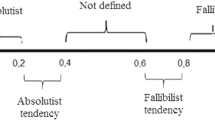Abstract
Rather than studying students’ perceptions of mathematics from a beliefs or identity framework with the purpose of improving the learning of mathematics, this study develops a Foucauldian framework, which allows a socio-critical interpretation of students’ perceptions, which are considered an indicator for their developing subjectivities. This allows me to discuss how diverging devotions to mathematics, suffering from mathematics as well as seeing personal relevance and challenges in mathematics connects to the institutional and societal functionality of mathematics education. Thereby, I also present data obtained in questionnaires from German ninth grade students.
Access this chapter
Tax calculation will be finalised at checkout
Purchases are for personal use only
Similar content being viewed by others
References
Braun, V., & Clarke, V. (2006). Using thematic analysis in psychology. Qualitative Research in Psychology, 3(2), 77–101. doi:10.1191/1478088706qp063oa.
de Lourdes Mata, M., Monteiro, V., & Peixoto, F. (2012). Attitudes towards mathematics: Effects of individual, motivational, and social support factors. Child Development Research. doi:10.1155/2012/876028.
Di Martino, P., & Zan, R. (2011). Attitude towards mathematics: A bridge between beliefs and emotions. ZDM, 43, 471–482.
Dowling, P. (1998). The sociology of mathematics education: Mathematical myths/pedagogic texts. London: Falmer.
Foucault, M. (1979). Discipline and punish: The birth of the prison. New York: Vintage. Original work published 1975.
Foucault, M. (1982). How is power exercised? In H. L. Dreyfus & P. Rabinow (Eds.), Michel Foucault. Beyond structuralism and hermeneutics (pp. 216–226). New York: Harvester.
Foucault, M. (1984). Preface to the history of sexuality, volume II. In P. Rabinow (Ed.), The Foucault reader (pp. 333–339). New York: Pantheon.
Goldin, G. A. (2002). Affect, meta-affect, and mathematical belief structures. In G. C. Leder, E. Pehkonen, & G. Törner (Eds.), Beliefs. A hidden variable in mathematics education? (pp. 59–72). Dordrecht: Kluwer.
Grootenboer, P., & Jorgensen, R. (2009). Towards a theory of identity and agency in coming to learn mathematics. Eurasia Journal of Mathematics, Science and Technology Education, 5(3), 255–266.
Gutiérrez, R. (1999). Advancing urban Latina/o youth in mathematics: Lessons from an effective high school mathematics department. Urban Review, 31(3), 263–281.
Heymann, H. W. (1996). Allgemeinbildung und Mathematik. [General education and mathematics]. Beltz: Weinheim.
Kilpatrick, J. (1992). A history of research in mathematics education. In D. A. Grouws (Ed.), Handbook of research on mathematics teaching and learning (pp. 3–38). New York: Macmillan.
Kislenko, K., Grevholm, B., & Lepik, M. (2007). Mathematics is important but boring: Students’ beliefs and attitudes towards mathematics. In C. Bergsten, B. Grevholm, H. S. Måsøval, & F. Rønning (Eds.), Relating practice and research in mathematics education. Proceedings of the Fourth Nordic Conference on Mathematics Education (pp. 349–360). Trondheim: Tapir.
Kollosche, D. (2014). Mathematics and power: An alliance in the foundations of mathematics and its teaching. ZDM Mathematics Education, 46(7), 1061–1072. doi:10.1007/s11858-014-0584-0.
Kollosche, D. (2015). Criticising with Foucault: Towards a guiding framework for socio-political studies in mathematics education. Educational Studies in Mathematics. doi: 10.1007/s10649-015-9648-5.
Lave, J. (1988). Cognition in practice: Mind, mathematics and culture in everyday life. Cambridge: Cambridge University Press.
Leder, G. C., Pehkonen, E., & Törner, G. (Eds.). (2002). Beliefs: A hidden variable in mathematics education? Dordrecht: Kluwer.
Lundin, S. (2012). Hating school, loving mathematics: On the ideological function of critique and reform in mathematics education. Educational Studies in Mathematics, 80(1–2), 73–85. doi:10.1007/s10649-011-9366-6.
Maaß, J., & Schlöglmann, W. (2000). Erwachsene und Mathematik. [Adults and mathematics]. Mathematica Didactica, 23(2), 95–106.
Maaß, J., & Schlöglmann, W. (Eds.). (2009). Beliefs and attitudes in mathematics education: New research results. Rotterdam: Sense.
Martin, D. B. (2009). Researching race in mathematics education. Teacher College Record, 111, 295–338.
Sfard, A., & Prusak, A. (2005). Telling identities: In search of an analytic tool for investigating learning as a culturally shaped activity. Educational Researcher, 34(4), 14–22. doi:10.3102/0013189X034004014.
Skott, J. (2014). Towards a participatory approach to “beliefs” in mathematics education. In B. Pepin & B. Rösken-Winter (Eds.), From beliefs to dynamic affect systems in mathematics education (pp. 3–23). Berlin: Springer.
Skovsmose, O. (2005). Travelling through education: Uncertainty, mathematics, responsibility. Rotterdam: Sense.
Stinson, D. W. (2004). Mathematics as “gate-keeper” (?): Three theoretical perspectives that aim toward empowering all children with a key to the gate. The Mathematics Educator, 14(1), 8–18.
Stinson, D. W. (2013). Negotiating the “white male math myth”: African American male students and success in school mathematics. Journal for Research in Mathematics Education, 44(1), 69–99. doi:10.5951/jresematheduc.44.1.0069.
Straehler-Pohl, H., & Pais, A. (2014). Learning to fail and learning from failure: Ideology at work in a mathematics classroom. Pedagogy, Culture and Society, 22(1), 79–96. doi:10.1080/14681366.2013.877207.
Ullmann, P. (2008). Mathematik, Moderne, Ideologie: Eine kritische Studie zur Legitimität und Praxis der modernen Mathematik. [Mathematics, modernity, ideology: A critical study on the legitimacy and praxis of modern mathematics]. Konstanz: UVK.
Valero, P. (2004). Socio-political perspectives on mathematics education. In P. Valero & R. Zevenbergen (Eds.), Researching the socio-political dimensions of mathematics education. Issues of power in theory and methodology (pp. 5–23). Boston: Kluwer.
Volmink, J. (1994). Mathematics by all. In S. Lerman (Ed.), Cultural perspectives on the mathematics classroom (pp. 51–67). Dordrecht: Kluwer.
Walshaw, M. (2007). Working with Foucault in education. Rotterdam: Sense.
Acknowledgments
This study was realised with the help of the students of the master seminar on “Student Perceptions of Mathematics” at the Universität Potsdam, Germany , in 2014. I am very grateful for their support in collecting the data and gathering ideas for analysis and interpretation.
Author information
Authors and Affiliations
Corresponding author
Editor information
Editors and Affiliations
Rights and permissions
Copyright information
© 2017 Springer International Publishing Switzerland
About this chapter
Cite this chapter
Kollosche, D. (2017). A Socio-critical Analysis of Students’ Perceptions of Mathematics. In: Straehler-Pohl, H., Bohlmann, N., Pais, A. (eds) The Disorder of Mathematics Education. Springer, Cham. https://doi.org/10.1007/978-3-319-34006-7_11
Download citation
DOI: https://doi.org/10.1007/978-3-319-34006-7_11
Published:
Publisher Name: Springer, Cham
Print ISBN: 978-3-319-34005-0
Online ISBN: 978-3-319-34006-7
eBook Packages: EducationEducation (R0)




